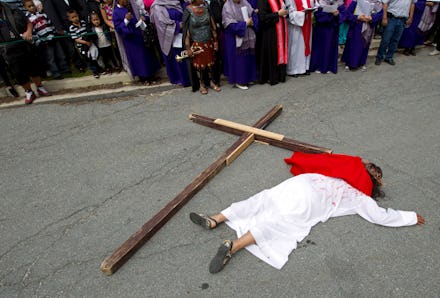Christianity Is Declining in a Country Where It Has Reigned for 1,400 Years

The news: It's not every day that the top religious leader of a country — or even a former one — declares religion's reign to be over.
But that's exactly what's happening in England, where former Archbishop of Canterbury Rowan Williams is making waves by claiming that Christianity is on the decline. Williams, who now serves as a member of the House of Lords, told the Sunday Telegraph this past weekend that while modern British culture is shaped by Christianity, the religion will experience "a further shrinkage of awareness and commitment" in the coming years.
"[Britain is] post-Christian in the sense that habitual practice for most of the population is not taken for granted," he said. "A Christian nation can sound like a nation of committed believers, and we are not that."
Christianity has dominated the British Isles for over 1,400 years.
Why this is important: Williams' comment comes at a tense moment in British politics. Prime Minister David Cameron caused a stir earlier this month when he wrote a piece for the Church Times encouraging Christians to be more open and confident about their faith.
"I believe we should be more confident about our status as a Christian country, more ambitious about expanding the role of faith-based organisations, and, frankly, more evangelical about a faith that compels us to get out there and make a difference to people's lives," he wrote.
Since then, politicians from either side of the aisle have come forward to weigh in on the subject. Cameron's own deputy prime minister, Nick Clegg, has called for a disestablishment of the Anglican Church and a complete separation of church and state, which has prompted fierce debate about the future of Christianity in British politics.
Current Archbishop of Canterbury Justin Welby supported Cameron's argument, though his thinking is also in line with his predecessor's. "It is clear that, in the general sense of being founded in Christian faith, this is a Christian country. It is certainly not in terms of regular churchgoing," he wrote in his blog.
And Williams has a point. Although both he and Welby have pointed at the pervasive influence that Christianity has in modern British culture when it comes to sheer numbers, Christianity is on the decline. In 2012, research by the House of Commons Library found that while other religions in Britain were on the rise, Christianity was steadily losing followers — around half a million every year. According to the study's projections, the population of atheists and agnostics will overtake Christians by 2030.
Image Credit: The Daily Mail
A similar study by the Pew Research Center also found that while more people were likely to identify their religion as Christianity, when the question was asked with slightly different wording — "What religion, religious denomination or body do you belong to?" — many more people identified as non-believers.
Image Credit: Pew Research Center
It's a very different picture from the U.S., where non-Christian religions make up less than 5% of the population. An overwhelming majority — 77% of the adult population — identify as Christian.
Image Credit: Gallup
But with increased immigration, the legalization of same-sex marriage and the rising popularity of atheism, the religious landscape in the U.K. looks very different from what you would find in the U.S. And though the influence of Christianity in British culture and politics can hardly be understated, Williams may have a point when it comes to what the future of religion will look like in Britain.